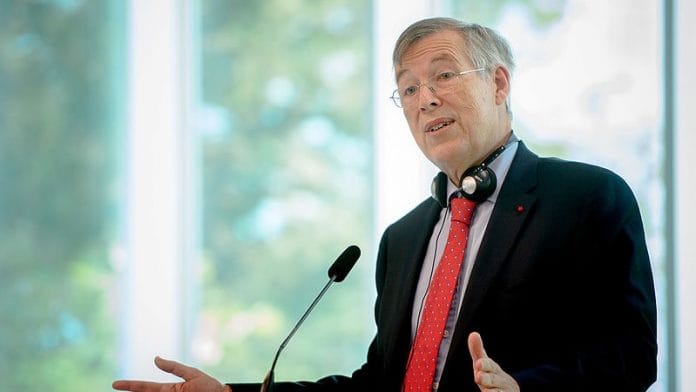New Delhi: It is precisely because Russia has a strong relationship with India that the ties between Moscow and Beijing are not an ‘alliance relationship’, said Professor Francois Heisbourg, senior adviser for Europe at the International Institute for Strategic Studies, as he unpacked the nuances of the India-China-Russia dynamic.
In conversation with ThePrint’s Editor-in-Chief Shekhar Gupta, during a virtual session of ‘Off The Cuff’, Heisbourg talked about Putin’s strategic blunders in the war in Ukraine, Russia’s relations with China and India, the economic fallout of the war for Moscow, the nuclear implications of the conflict and much more.
Critiquing the fallout of Putin’s transgressions in Ukraine, Heisbourg said, “Putin’s accomplishment will be to accelerate the decline of Russia in general terms”.
Further, the professor added that this “failed war” would mark the end of Putin’s attempt to recreate a form of Imperial Russia.
Alluding to Ukraine’s centrality in the Soviet Union, Heisbourg remarked: “Ukraine was the most important non-Russian republic in the Soviet Union; Putin’s dream was to bring it back into a form of neo-empire that has now utterly failed in terms of acceptability to the Ukrainian people”.
The Ukrainians will “never-ever” think of joining a Russian-led empire or bloc; in essence, it’s a “strategic avalanche to his own detriment”, pointed Heisbourg as he unravelled the pitfalls of Putin’s invasion.
“In strategic terms, it is already a defeat for Russia. The war aims for Putin was to create a situation in which Ukraine was neither a state, nor a people. That has not happened,” said the senior adviser.
Russia’s most consequential partners
Categorising India and China as Russia’s most consequential strategic partners, Heisbourg put the caveat that they are “consequential partners of different natures and implications”.
Elaborating on the caveat, Heisbourg said that Russia’s relations with India form the basis for the limits to its strategic partnership with China. “It is precisely because Russia has a strong relationship with India that the relationship between Moscow and Beijing is not an alliance relationship,” he stated.
Arguing that if Russia and China had an alliance partnership, he stated that Russia would be alongside China at the Himalayas, in reference to India’s more-than two-year standoff with the Chinese at the Line of Actual Control (LAC).
China always pursues its national interest and is doing the same at this moment. For China, the main goal is to weigh against the US; Russia is essential to this. Countering the US is central to the China-Russia partnership, explained Heisbourg.
Specifically, with regard to the conflict in Ukraine, Heisbourg underlined, “What happens in Ukraine isn’t necessarily a problem for China. What China and Russia both want is a free-hand vis-à-vis the contingencies in their regions.”
Economic fallout for Moscow
Unpacking the significance of the war on Russia’s economy, the senior adviser explained that there are “two dimensions.”
Firstly, “Globally, the GDP of Russia is somewhere between that of Spain and Italy; this is not an economic superpower. After the sanctions, these figures are not going to improve,” said Heisbourg.
Secondly, “there are areas where Russia is a superpower, such as energy and gas. As a result of the war, the green agenda will be accelerated,” explained Heisbourg, as he alluded to European states decoupling from Russia as a source of energy and gas.
In essence, Heisbourg explained that both these impacts—GDP contraction and green transitions—could have a devastating impact on Russia’s economy and leave them with “stranded assets” in 10-20 years.
Nuclear rhetoric and the war
The professor argued that the scale of nuclear rhetoric has considerably de-escalated since the start of the Ukraine war.
For Heisbourg, there are minimal chances of any further escalatory nuclear rhetoric. “The threat level is actually lower on the nuclear score than it was at the very beginning of the Ukraine war”.
“Putin knows, as do all other Russians in positions of responsibility, that nuclear deterrence is an entirely mutual affair. It may not be worth the destruction of Russia just to retain the Donbas region in Ukraine,” Heisbourg presciently stated.

Also read: Putin wants to be seen as ‘unifier of Russia’, says Finland’s former PM, Alexander Stubb






